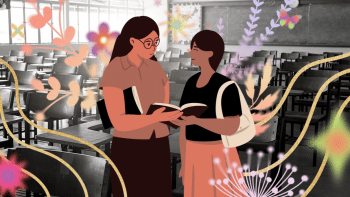Inequity in education is holding us back

They called him boigyanik (scientist) Gias. He was the son of an honest hardworking farmer growing up in a small village in Cox's Bazar—salt-farms and paddy fields all around, with the sea just 35 kilometers away. He was the eldest of eight siblings, and his thirst for knowledge was unmatched. He was interested in science. It was the early 80s, and a young boy in a village school had little resources to satisfy his yearning to learn. The teachers couldn't do much either. The boy learned the harsh lesson that having an immense curiosity and passion for knowing wasn't enough. Still relentless, he opened a science club in his village.
That little boy, whom I later got to know as my eldest brother-in-law, never got the opportunity to learn science like I did living in Dhaka. I imagine countless more children like him, growing up across rural areas in Bangladesh. I wonder how many of them dream of someday becoming scientists, writers, professors, doctors, or engineers. With sadness, I then wonder, how many of their dreams will be broken soon because we have not been able to ascertain equity in our educational provisions.
Inequality and inequity remain harsh realities in Bangladesh. The truth is that talent in Bangladesh is in no way limited to the mega cities like Dhaka, but opportunities, in many instances, are limited. If we are to truly ever graduate from our lower-middle income status, we need to first and foremost channel our efforts towards increasing access to the same standard of education across rural and urban areas by investing in education in our villages. We need to support children from poorer socio-economic backgrounds and marginalised populations.
It's not that children from these backgrounds don't shine. The point is that not enough get the support they need and those who do make it to the other side are exceptions, not examples. They say it takes a village to raise a child, but the reality is that not everyone has that support, and this is where we need to play a role through education. We need to determine what helps children to achieve intergenerational mobility, that is, what helps them to move beyond the struggles their parents faced.
We also need to be careful of the inherent bias and elitism in our ideas. We think and say things like "Not everyone should go to university, not everyone needs a Masters" without assuring that anyone and everyone can if they want to. Yes, it doesn't make sense for scores of students to go for a Masters or PhDs if they're ultimately not going into academia, but this thought is biased until we can assure that anyone and everyone—regardless of their background—can pursue these paths if they want to. Otherwise, it's just another elite filtering where the privilege of being born in a city or into a stronger socio-economic background with more exposure to networks and connections plays a dominant role.
Privilege is power but it's a responsibility too. This is where it gets tricky. Privilege shouldn't lead to entitlement. However, it is also unjust if every achievement of someone privileged is labelled to be a result of their background, hence belittling the person's own talent or hard work. Yes, privilege plays an important role in the person being able to leverage their talent but we must remember that not all privileged make a difference in the world. Just like not everyone with privilege gives proper credit to their fortune, to how it helped. Of course, there are also those who use their privilege and connections unethically to achieve their goals, often not even realising that they are robbing someone else's rightful place to make space for themselves. These wrongful practices are, sadly, rampant and evident all around us. No, this is not privilege—it's the misuse of privilege. There's a difference.
Equity is an attempt to make the playing field as equal as possible. This is why many educationists abroad have also been contending for "weighted grades" in assessing students so that we can account for socio-economic background factors. To this effect, demanding adjustments to the quota system at the university level and beyond, as argued by our youth who took to the streets in 2018, is a rightful demand.
Quotas are meant to bring balance and we have several quotas that are arguably unnecessary. For instance, quotas for children of university faculty members. These children already have the intergenerational advantage of growing up in homes where their parents are teachers. This quota is often even harmful because the children of faculty members face prejudice if they end up, on their own merit and without quota, as faculty members—they rarely escape conjectures that they didn't earn their place. Instead, we need quotas for children of farmers from rural villages, for bright enthusiastic children from families where they would be the first to go to university. Our classrooms need this variation. We can only truly prosper if we prosper together and so, we need to ascertain the representation of voices from all walks of life. What's stopping us?
Dr Rubaiya Murshed is lecturer (on study leave), Department of Economics, University of Dhaka, and recent PhD from the University of Cambridge.
Views expressed in this article are the author's own.
Follow The Daily Star Opinion on Facebook for the latest opinions, commentaries and analyses by experts and professionals. To contribute your article or letter to The Daily Star Opinion, see our guidelines for submission.

 For all latest news, follow The Daily Star's Google News channel.
For all latest news, follow The Daily Star's Google News channel. 







Comments